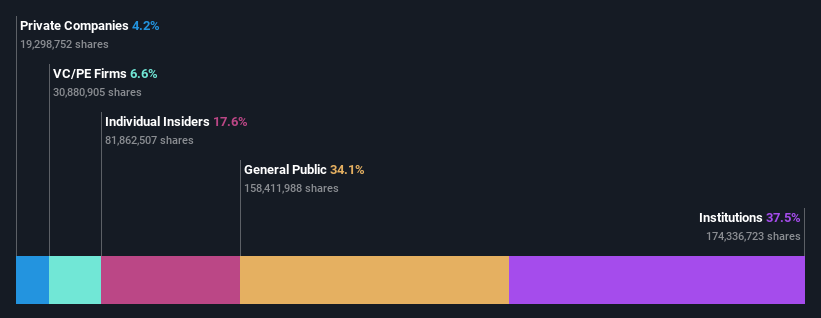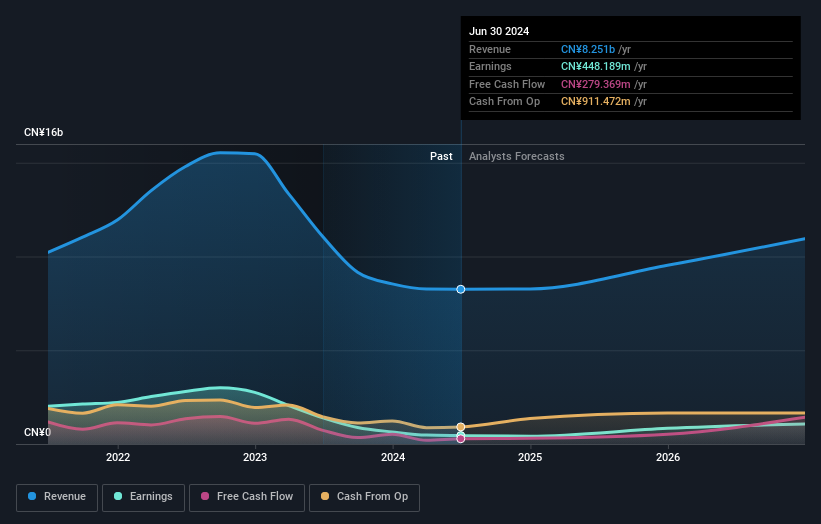Following a 35% decline over last year, recent gains may please Guangzhou Kingmed Diagnostics Group Co., Ltd. (SHSE:603882) institutional owners
Key Insights
- Significantly high institutional ownership implies Guangzhou Kingmed Diagnostics Group's stock price is sensitive to their trading actions
- The top 11 shareholders own 51% of the company
- Insiders own 18% of Guangzhou Kingmed Diagnostics Group
To get a sense of who is truly in control of Guangzhou Kingmed Diagnostics Group Co., Ltd. (SHSE:603882), it is important to understand the ownership structure of the business. We can see that institutions own the lion's share in the company with 38% ownership. Put another way, the group faces the maximum upside potential (or downside risk).
Institutional investors would appreciate the 4.1% increase in share price last week, given their one-year losses have totalled a disappointing 35%.
Let's take a closer look to see what the different types of shareholders can tell us about Guangzhou Kingmed Diagnostics Group.
Check out our latest analysis for Guangzhou Kingmed Diagnostics Group

What Does The Institutional Ownership Tell Us About Guangzhou Kingmed Diagnostics Group?
Many institutions measure their performance against an index that approximates the local market. So they usually pay more attention to companies that are included in major indices.
Guangzhou Kingmed Diagnostics Group already has institutions on the share registry. Indeed, they own a respectable stake in the company. This can indicate that the company has a certain degree of credibility in the investment community. However, it is best to be wary of relying on the supposed validation that comes with institutional investors. They too, get it wrong sometimes. When multiple institutions own a stock, there's always a risk that they are in a 'crowded trade'. When such a trade goes wrong, multiple parties may compete to sell stock fast. This risk is higher in a company without a history of growth. You can see Guangzhou Kingmed Diagnostics Group's historic earnings and revenue below, but keep in mind there's always more to the story.

Hedge funds don't have many shares in Guangzhou Kingmed Diagnostics Group. Looking at our data, we can see that the largest shareholder is the CEO Yaoming Liang with 16% of shares outstanding. For context, the second largest shareholder holds about 6.6% of the shares outstanding, followed by an ownership of 6.2% by the third-largest shareholder.
Looking at the shareholder registry, we can see that 51% of the ownership is controlled by the top 11 shareholders, meaning that no single shareholder has a majority interest in the ownership.
While studying institutional ownership for a company can add value to your research, it is also a good practice to research analyst recommendations to get a deeper understand of a stock's expected performance. Quite a few analysts cover the stock, so you could look into forecast growth quite easily.
Insider Ownership Of Guangzhou Kingmed Diagnostics Group
The definition of an insider can differ slightly between different countries, but members of the board of directors always count. Company management run the business, but the CEO will answer to the board, even if he or she is a member of it.
Insider ownership is positive when it signals leadership are thinking like the true owners of the company. However, high insider ownership can also give immense power to a small group within the company. This can be negative in some circumstances.
Our information suggests that insiders maintain a significant holding in Guangzhou Kingmed Diagnostics Group Co., Ltd.. It is very interesting to see that insiders have a meaningful CN¥3.1b stake in this CN¥18b business. Most would say this shows a good degree of alignment with shareholders, especially in a company of this size. You can click here to see if those insiders have been buying or selling.
General Public Ownership
The general public, who are usually individual investors, hold a 34% stake in Guangzhou Kingmed Diagnostics Group. This size of ownership, while considerable, may not be enough to change company policy if the decision is not in sync with other large shareholders.
Private Equity Ownership
With a stake of 6.6%, private equity firms could influence the Guangzhou Kingmed Diagnostics Group board. Some investors might be encouraged by this, since private equity are sometimes able to encourage strategies that help the market see the value in the company. Alternatively, those holders might be exiting the investment after taking it public.
Private Company Ownership
Our data indicates that Private Companies hold 4.2%, of the company's shares. It might be worth looking deeper into this. If related parties, such as insiders, have an interest in one of these private companies, that should be disclosed in the annual report. Private companies may also have a strategic interest in the company.
Next Steps:
While it is well worth considering the different groups that own a company, there are other factors that are even more important. Take risks for example - Guangzhou Kingmed Diagnostics Group has 3 warning signs (and 1 which is a bit concerning) we think you should know about.
Ultimately the future is most important. You can access this free report on analyst forecasts for the company.
NB: Figures in this article are calculated using data from the last twelve months, which refer to the 12-month period ending on the last date of the month the financial statement is dated. This may not be consistent with full year annual report figures.
Have feedback on this article? Concerned about the content? Get in touch with us directly. Alternatively, email editorial-team (at) simplywallst.com.
This article by Simply Wall St is general in nature. We provide commentary based on historical data and analyst forecasts only using an unbiased methodology and our articles are not intended to be financial advice. It does not constitute a recommendation to buy or sell any stock, and does not take account of your objectives, or your financial situation. We aim to bring you long-term focused analysis driven by fundamental data. Note that our analysis may not factor in the latest price-sensitive company announcements or qualitative material. Simply Wall St has no position in any stocks mentioned.
 Index Options
Index Options CME Group
CME Group Nasdaq
Nasdaq Cboe
Cboe TradingView
TradingView Wall Street Journal
Wall Street Journal